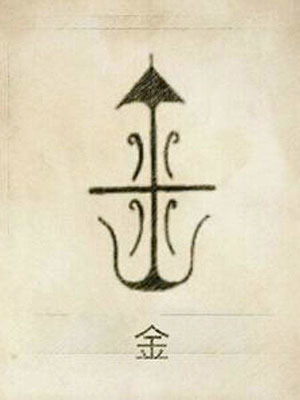Introduction
The Jin(jīn) surname is one of the most fascinating and culturally rich surnames in Chinese history. With origins tracing back over 3,000 years, the Jin family has played a significant role in shaping China's political, cultural, and scientific landscapes. This article explores the origins, historical figures, cultural significance, and modern influence of the Jin surname, offering a comprehensive look at its enduring legacy.

Ⅰ、 Origins: A Tapestry of Ancient Legends and Cultural Integration
The Jin surname's origins reflect the dynamic interplay of ancient myths, political changes, and ethnic integration in Chinese history.
1. Descendants of Shaohao
The primary origin of the Jin surname is linked to Shaohao, one of the legendary Five Emperors of ancient China. Known as the "Golden Heavenly Emperor," Shaohao's descendants adopted "Jin" (meaning "gold") as their surname, symbolizing their connection to metallurgy and the west (associated with the metal element in Chinese philosophy).
2. The Xiongnu Royal Connection
During the Western Han Dynasty, Jin Midi, the son of a Xiongnu king, surrendered to the Han Empire. Because of his role in crafting golden statues for worship, Emperor Wu bestowed the surname "Jin" upon him. His descendants became a prominent branch of the Jin family.
3. Name Changes and Imperial Grants
During the Five Dynasties period, some members of the Liu family changed their surname to Jin to avoid naming taboos.
Ethnic groups like the Tangut and Manchu adopted the Jin surname during their integration into Han Chinese culture.
4. Occupational Origins
In ancient China, "Jin" was associated with metallurgy and finance. Families involved in metalworking or treasury management adopted "Jin" as their surname.
Ⅱ、Historical Figures: A Legacy of Excellence Across Fields
The Jin surname has produced an extraordinary array of historical figures who have left indelible marks on Chinese history and culture.
1. Politics and Military
Jin Midi (134–86 BCE): A trusted advisor to Emperor Wu of Han, he was the first ethnic minority to hold a high-ranking position in the Han court.
Jin Youzi (1368–1431): A Ming Dynasty statesman who accompanied Zheng He on his maritime expeditions and authored Records of the Northern Campaigns.
Jin Shun (1831–1886): A Qing Dynasty general who played a key role in reclaiming Xinjiang.
2. Literature and Arts
Jin Shengtan (1608–1661): A literary critic known for his commentaries on Water Margin and The Romance of the West Chamber.
Jin Nong (1687–1763): A leading figure of the "Eight Eccentrics of Yangzhou," renowned for his unique "lacquer script" calligraphy.
Jin Yong (1924–2018): A master of modern martial arts novels, whose works like The Legend of the Condor Heroes have been translated into 12 languages.
3. Science and Technology
Jin Baozhen (1907–1968): A pioneer in engineering mechanics who designed China's first Yangtze River Bridge.
Jin Shanbao (1895–1997): Known as the "Father of Wheat," he developed high-yield wheat varieties that helped alleviate food shortages in early modern China.
4. Philosophy and Thought
Jin Yuelin (1895–1984): A logician and philosopher who integrated Chinese and Western thought in his work On Dao.
Jin Kemu (1912–2000): A polymath fluent in 14 languages, known for his contributions to Eastern studies.
Ⅲ、 Cultural Significance: A Symbol of Wealth and Wisdom
The Jin surname embodies key aspects of Chinese culture, from philosophical ideals to family values.
1. The Five Elements Philosophy
In Chinese cosmology, "Jin" (gold) represents:
Material Wealth: Phrases like "a house full of gold and jade" symbolize prosperity.
Moral Strength: The idiom "gold and stone can be split" reflects resilience and determination.
2. Clan Culture and Traditions
Ancestral Halls: The Jin family's ancestral halls, such as the "Lize Hall," are named after Confucian ideals.
Family Instructions: The Jin Clan Rules emphasize values like education, filial piety, and integrity.
3. Ethnic and Cultural Integration
The Jin surname reflects the blending of Han Chinese culture with ethnic traditions, such as the She people's folk songs and Manchu shamanistic rituals.
Ⅳ、Modern Influence: From the Silk Road to Globalization
The Jin surname continues to make an impact in contemporary society, both in China and globally.
1. Demographic Distribution
Ancient Times: Jin families spread along the Silk Road, from Chang'an to Dunhuang.
Modern Era: The Jin surname ranks 64th in China, with a population of about 4.3 million.
2. Contemporary Contributions
Economics: Jin Liqun, the first president of the Asian Infrastructure Investment Bank, promotes international financial cooperation.
Science: Jin Li, a leading geneticist, has advanced research on East Asian human genomes.
Culture: In South Korea, the Kim (Jin) surname is the most common, reflecting shared cultural roots.
3. Global Cultural Exchange
The Jin surname is celebrated in overseas Chinese communities, from Singapore's Jin Clan Association to San Francisco's "Golden Mountain Hall."
Nobel Prize-winning poet Kim Sowol (Korean Jin surname) has inspired readers worldwide.
Ⅴ、Conclusion
The Jin surname is a testament to the resilience and adaptability of Chinese culture. From the ancient metallurgy of Shaohao's descendants to the literary genius of Jin Yong, and from the scientific achievements of Jin Baozhen to the global influence of modern Jin descendants, this surname has left an indelible mark on history. As we move further into the 21st century, the Jin family continues to bridge tradition and innovation, proving that their legacy is as dynamic as it is enduring.